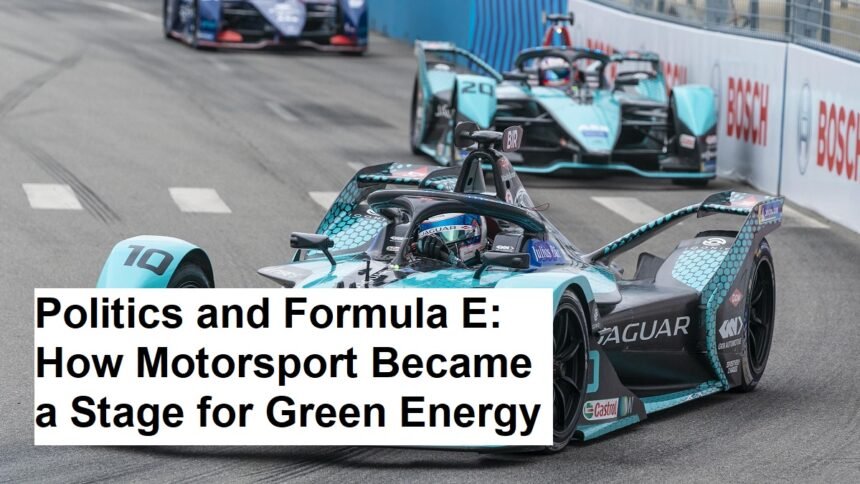Introduction: When Motorsport Meets Politics
For decades, motorsport has symbolized speed, prestige, and innovation. But in recent years, a new player has entered the track: Formula E, the world’s first fully electric racing series. Unlike Formula 1, Formula E doesn’t just showcase cars—it showcases politics, energy strategy, and the future of green mobility.
The rise of Formula E is about more than entertainment. It reflects global debates on energy transition, sponsorship politics, and how sports can become platforms for sustainability. Let’s dive into the complex relationship between politics and Formula E, and how it affects fans, sponsors, and the future of green motorsport.
The Political DNA of Formula E
Why Formula E Was Born
Formula E launched in 2014, not just to entertain but to promote electric mobility. The series was designed as a political statement: that the automotive world can—and must—embrace cleaner energy.
A Global Stage for Green Energy
Each Formula E race takes place in major cities—London, New York, Jakarta, Berlin—not just traditional race tracks. The reason? To put electric mobility in front of urban populations and connect it directly to discussions about energy policies and urban sustainability.
Practical Insight for Fans: If you’re following Formula E, pay attention to host cities. Often, they align with governments pushing stronger green energy policies.
Green Motorsport: More Than Just Cars
Formula E as a Symbol of Energy Transition
Unlike petrol-powered motorsport, Formula E stands as a green motorsport experiment. It symbolizes the shift from fossil fuels to renewable energy, making it not just a sport, but also a public demonstration of what cleaner transport could look like.
The Role of Innovation
From battery technology to fast-charging systems, Formula E acts as a testing ground for future EV technologies. Many of these innovations trickle down to consumer electric vehicles, directly influencing the global automotive industry.
Practical Tip for Tech Enthusiasts: Keep an eye on Formula E’s battery and charging innovations—they often become part of mainstream EVs within a few years.
Sponsorship Politics in Formula E
When Brands and Governments Collide
Formula E sponsorship is about more than brand exposure. Companies and governments see it as a way to signal commitment to sustainability. Energy firms, car manufacturers, and even countries use sponsorships to polish their green credentials.
For example:
- Oil and gas companies sponsor races to showcase their investments in renewables.
- Governments back events to prove they are aligned with global sustainability goals.
- Tech companies invest to highlight their clean energy innovations.
The Hidden Political Agenda
Critics argue that some sponsorships act as greenwashing, where companies highlight small green initiatives while continuing environmentally harmful practices elsewhere.
Practical Tip for Viewers: Always look beyond the logos. Ask: Is this sponsor genuinely investing in sustainability, or just using Formula E as PR?
Global Energy Policy and Formula E
Racing as Energy Diplomacy
Formula E is closely linked to global energy policies. Countries hosting races often use them as opportunities to promote renewable energy initiatives or strengthen their role in the international clean energy market.
For instance:
- The Berlin E-Prix aligns with Germany’s strong push toward renewable energy.
- The Jakarta E-Prix highlights Indonesia’s growing commitment to EV adoption.
- The Saudi Arabian E-Prix reflects the kingdom’s ambition to diversify from oil to clean energy investments.
A Reflection of Energy Politics
Formula E races don’t happen by accident—they reflect political decisions, energy diplomacy, and global market positioning.
Practical Tip for Students or Analysts: Use Formula E races as case studies to understand how global energy transitions play out on the public stage.
Challenges of Mixing Politics and Motorsport
The Risk of Over-Politicization
While politics and Formula E are inseparable, there’s a risk: fans may feel alienated if the sport becomes more about political messaging than racing excitement.
Balancing Sport and Advocacy
Formula E must maintain a balance between being an entertaining motorsport and an advocacy platform for clean energy. Too much focus on politics could reduce fan engagement, while too little could weaken its mission.
Practical Tip for Organizers: Keep the racing competitive and exciting while highlighting sustainability in creative, non-preachy ways.
Who Benefits from Formula E’s Political Dimension?
The Winners
- Automakers: They get to showcase EV innovations in front of a global audience.
- Governments: Hosting races helps promote green policies.
- Fans: They witness technology that could shape the future of everyday driving.
The Losers
- Traditional motorsport industries: Formula 1 and other petrol-based sports face criticism for lacking sustainability.
- Fossil fuel companies: They face increasing pressure to adapt or risk losing influence.
- Skeptical fans: Some dismiss Formula E as “too political” compared to traditional racing.
The Future of Politics and Formula E
Looking ahead, politics and Formula E will become even more intertwined. As global governments strengthen climate commitments, Formula E will serve as a powerful marketing and advocacy platform.
Expect more:
- Government-backed EV policies announced around races.
- Increased sponsorship from renewable energy companies.
- Closer ties between Formula E and international climate summits.
Formula E is not just a race—it’s part of the global strategy to shift automotive culture toward sustainability.
Conclusion: Formula E as a Political Track
Formula E proves that motorsport can be more than entertainment—it can be a stage for energy politics, corporate sponsorship battles, and a vision of green mobility.
For fans, it’s thrilling to see cars race silently through city streets. For governments and businesses, it’s a tool to shape public perception of clean energy. And for the future of mobility, it’s a testing ground for technologies that will one day power our daily drives.
Your Turn: Do you think Formula E is genuine in promoting green energy, or is it just another political and marketing tool? Share your thoughts in the comments below!












